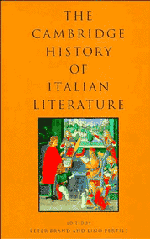Book contents
- Frontmatter
- Origins and Duecento
- The Trecento
- The Quattrocento
- The Cinquecento
- The Seicento: Poetry, Philosophy and Science
- Narrative prose and theatre
- 19 Narrative prose
- 20 Theatre
- 21 Opera
- The Settecento
- The Age of Romanticism (1800–1870)
- The Literature of United Italy (1870–1910)
- The Rise and Fall of Fascism (1910–45)
- The Aftermath of the Second World War (1945–56)
- Contemporary Italy (since 1956)
- Bibliography
- References
21 - Opera
from Narrative prose and theatre
Published online by Cambridge University Press: 28 March 2008
- Frontmatter
- Origins and Duecento
- The Trecento
- The Quattrocento
- The Cinquecento
- The Seicento: Poetry, Philosophy and Science
- Narrative prose and theatre
- 19 Narrative prose
- 20 Theatre
- 21 Opera
- The Settecento
- The Age of Romanticism (1800–1870)
- The Literature of United Italy (1870–1910)
- The Rise and Fall of Fascism (1910–45)
- The Aftermath of the Second World War (1945–56)
- Contemporary Italy (since 1956)
- Bibliography
- References
Summary
The beginnings of opera
With the production of Guarini's Pastor fido (see above, p. 297) at Mantua in 1598 we reach one of the most momentous periods in the history of the Italian theatre. The same year also saw the staging, in Jacopo Corsi's Florence home, of what is generally accepted as the first ‘real’ opera, the Dafne of Ottavio Rinuccini (1562–1621), set to music by Jacopo Peri (1561–1633). In 1600 Rinuccini and Peri collaborated on a more ambitious work, Euridice, which was staged in the Pitti Palace during the celebrations for the wedding of Maria de' Medici and Henry IV of France. A few years later, in Mantua, the first two operas of Claudio Monteverdi (1567–1643) were produced. One, Arianna (1608), though it seems to have created the deeper impression on his contemporaries, is lost, except for various versions of its great lament ‘Lasciatemi morire’; the other, Orfeo (1607), thanks to the fact that it was published, is preserved in a relatively unproblematic state, and is admired (and regularly performed) as the first classic in the 300-year tradition of Italian opera.
Monteverdi's mastery of so complex a medium would not have been possible if opera had simply been ‘invented’ ten years earlier by Rinuccini and Peri. In fact all three men drew on an accumulated wealth of practical experience relating to the combination of music and dramatic poetry, and – perhaps even more important – on a wealth of ideals and imaginative visions, inherited from humanist scholars and poets, which suggested to them what further and greater things might still be possible in this field.
- Type
- Chapter
- Information
- The Cambridge History of Italian Literature , pp. 336 - 340Publisher: Cambridge University PressPrint publication year: 1997

